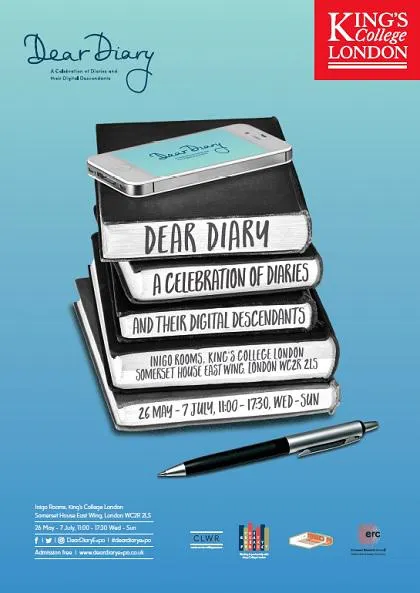Diaries 2.0
Diaries 2.0: why?
Explanation of research subjects by academics could be a lively genre. There are possible narratives of paths crossed; books encountered like signposts, inns, hotels, forums; conversations with people which spark something, then or later; ideas formulated, haphazardly (etymologically, chancing risks); long hours in libraries. There’s also likely to be an underrunning explanation – underpinning, undermining – a psychoanalytic account which could encompass attraction, defence, transference, affect, repression, sublimation, even regression. In lieu of both these possibilities, here is a story. One day a historian chatting with a professor recommended an archive, both for the beauty of its architecture and the fascination of its contents, and suggested the professor host a talk by those who cared for it. That happened, on 26 February 2014. The professor and the archive director liked each other. The professor had spent twenty years reading other people’s letters, and was interested in how diaries, like letters, exemplify the democracy of subjectivity and the power of writing. Both genres are considered major forms of ego-document by the small group of scholars who work on ego documents. ‘Diaries are among our most precious items of heritage. People in all walks of life have confided and often still confide their thoughts and experiences to the written page, and the result is a unique record of what happens to an individual over months, or even years, as seen through their eyes. No other kind of document offers such a wealth of information about daily life and the ups and downs of human existence. The Project’s idea is to collect as many diaries as possible from now on for long-term preservation. In the future these diaries will be a precious indication of what life, in our own time, was really like.’ ~ The Great Diary Project, Bishopsgate Institute, London.
In 2014, the Ego Media research group was also coming together. The professor – familiar with epistolary technology in terms of quills, sealing wax, sand – thought about long histories of genres. What were their evolutions into online forms? She had published an article on letters in the 21st century [Brant, Clare. “Devouring Time Finds Paper Toughish: What's Happened to Handwritten Letters in the Twenty-First Century?” a/b: Auto/Biography Studies 21.1 (2006): 7–19.] But diaries…? What would turn up as Diaries 2.0? The professor and the director then expended great energy on making an exhibition: Dear Diary. There were other related events – a day of talks, Diaryfest, at the Centre for Life-Writing Research, KCL; workshops with diarists; many interviews. The professor is very grateful to the director, who knows a great deal about diaries, to everyone who participated, and to those people and bodies who provided the money to undertake and share the research. Unlike novels, diaries rarely end with The End.
Dear Diary – the exhibition

Exhibition Guide
You can download the Exhibition Guide by clicking on the Reports tab below
Diaries Timeline
The exhibition space we were working with was awkward. It became increasingly so as two rooms were claimed for offices when we were half way through planning. We had to think (again) how to use corridor and wall space in what was quite a labyrinth, and one for which entrance doubled as exit. We thought of a timeline as a way to bring everything together: if you looked at it on the way in, you might pick up a sense of historical flow; if you looked at it on the way out, you might see coherence emerge.
See our diaries timeline.
Dear Diary Playlist
Our playlist of songs about – or related to – diaries can be found on Youtube at https://www.youtube.com/playlist?list=PL_-qQI9mPUcny59F2oKC50tPr2J5yJYl9
Exhibition videos
The following videos were made for the Dear Diary exhibition
Introduction to the Dear Diary exhibition
Diary Apps
Writing the Health Self – Rachael Kent
Narrating (M)others' Lives – Mikka Lene Pers
Einsam – Dear Diary




